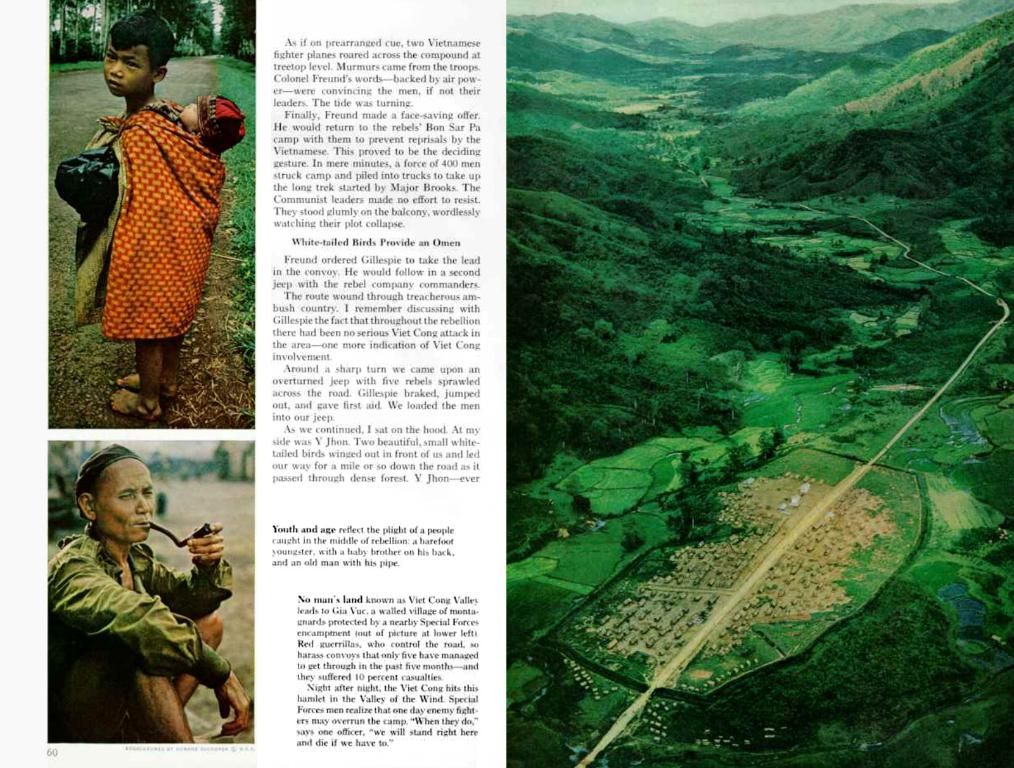Navigating Armenia's Political Labyrinth: The Challenges Facing Prime Minister Nikol Pashinyan
Pashinyan abolishes the Karabakh exiled administration
In a game of high-stakes diplomacy, Armenian Prime Minister Nikol Pashinyan finds himself grappling with a plethora of political challenges. His mission? To strike a peace accord with Azerbaijan, adjust Armenia's geopolitical trajectory away from Russia, and steer clear of the clutches of displaced leaders from Nagorno-Karabakh.
The bumpy road to peace with Azerbaijan has prompted intense domestic opposition, particularly among residents evicted from Nagorno-Karabakh in 2023. Pashinyan's aim to establish a border delimitation deal with Azerbaijan, a precursory step to a comprehensive peace settlement, has ignited resentment due to its implementation pages.
Refusing to fill the vacuum left by the exiled leaders of Nagorno-Karabakh, Pashinyan's intention is to sideline them during negotiations with Azerbaijan. In a frank statement, he articulated that "no other government can exist" apart from the Government of the Republic of Armenia within the nation's borders.
Pashinyan's concern regarding infiltration by external forces is not misplaced. Echoing this sentiment, former President of the de facto Nagorno-Karabakh government, Samvel Shahramanyan, recently attended a pro-Russia event in Yerevan. Russian Ambassador to Armenia, Sergei Koprikin, dubbed those present as "friends of Russia."
Sidelined since September 2023, Shahramanyan, however, spoke to French newspaper Le Figaro about the role of Nagorno-Karabakh's state bodies in the development of Artsakh's representative office in Yerevan. He deemed the dissolution of Nagorno-Karabakh as "illegal," but acknowledged it as the best way to safeguard Karabakh Armenian lives.
The opposition to a government in exile has sparked criticism from refugee advocates. Artak Beglaryan, former Artsakh ombudsman, branded Pashinyan's stance as unacceptable. Meanwhile, many Karabakh refugees have taken matters into their own hands, protesting against insufficient government resettlement assistance. They seek improved housing and amenities, preferring urban living despite higher costs.
The tumultuous relationship between Pashinyan and Karabakh Armenian leaders stretches back long before Azerbaijan's victory in the second Karabakh war. The so-called Karabakh clan, led by former presidents Robert Kocharyan and Serzh Sargsyan, controlled Armenian politics for two decades until 2018.
Originally ousted by Pashinyan during the 2018 uprising, the duo had orchestrated the ouster of Armenia's first president, Levon Ter-Petrosyan, in 1998. Known for their opposition to peace agreements with Azerbaijan, both Ter-Petrosyan and Pashinyan had once shared strong ties. Today, their alliance lies shattered, making it unlikely for Pashinyan to give any significant voice to the former Nagorno-Karabakh leadership in policy matters.
In response to potential challenges from displaced leaders, Pashinyan has warned that such actions would be met with a firm response from the Republic of Armenia. A stern statement echoed the sentiment: "Such actions against the state ... cannot remain unresponded to by the Republic of Armenia."
Additional Insights:
The displacement of Nagorno-Karabakh's leadership has left the region bereft of political representation. As Azerbaijan reasserts control over the region, the political landscape undergoes significant shifts, leading to contentious debates and potential challenges within Armenia. The outcome of peace negotiations between Armenia and Azerbaijan will play a crucial role in determining the future role and influence of these displaced leaders. The future holds uncertainty as both constitutional and territorial disputes persist, prolonging the stalemate.
[1] The Observatory of Political and Military Crises & Conflicts. (2021). Nagorno-Karabakh: Fighting resumes as peace talks stall. Broker Centre.[2] The New York Times. (2023). Armenia’s Civilians Flee a New Barrage of Bombing.[3] Council on Foreign Relations. (2020). Nagorno-Karabakh Crisis Fact Sheet. Retrieved from cfr.org[4] The Washington Post. (2021). What you need to know about the Nagorno-Karabakh conflict. Retrieved from www.washingtonpost.com[5] Carnegie Endowment for International Peace. (2021). Armenia After the Elections: Dealing With Uncertainty and Crisis. Retrieved from carnegieendowment.org
- The political landscape of Armenia is fraught with challenges, as Prime Minister Nikol Pashinyan navigates the complexities of peace negotiations with Azerbaijan, which has sparked intense opposition, particularly among displaced residents from Nagorno-Karabakh, who resent his proposed border delimitation deal.
- Rejecting the influence of exiled leaders from Nagorno-Karabakh, Pashinyan maintains that only the Government of the Republic of Armenia has legitimate authority within the nation's borders, in light of Azerbaijan's increasing control over the region following the second Karabakh war.
- As the displacement of Nagorno-Karabakh's leadership leaves the region bereft of political representation, the outcome of peace negotiations between Armenia and Azerbaijan will have profound implications for the future role and influence of these displaced leaders, potentially leading to contentious debates and challenges within Armenia.








